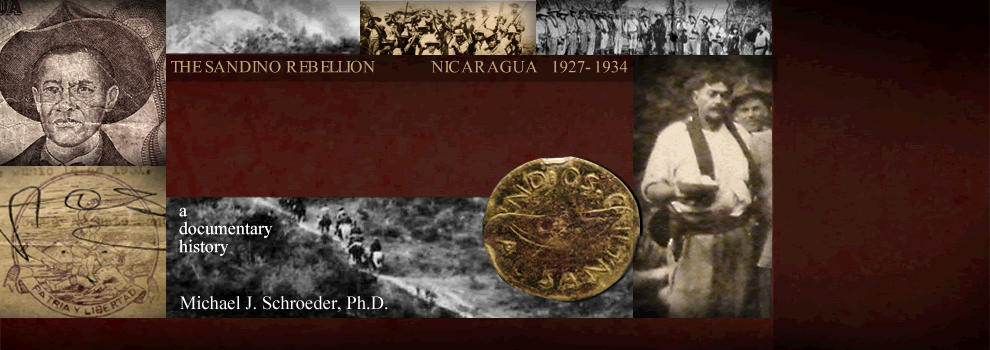|
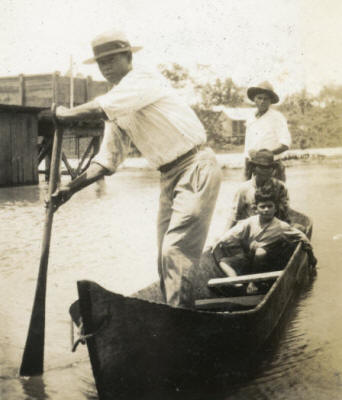 THIS IS THE SECOND PAGE OF
DOCUMENTS FOR THE SECOND HALF OF 1932
on Nicaragua's Caribbean Coast region , housing
documents dated during the 92 days from October 1 to
December 31.
THIS IS THE SECOND PAGE OF
DOCUMENTS FOR THE SECOND HALF OF 1932
on Nicaragua's Caribbean Coast region , housing
documents dated during the 92 days from October 1 to
December 31.
And so the year 1932 ends with a
whimper, as the EDSN
effectively ends its military
campaigns in the Caribbean Coast
region after mid-July. The region’s
quiescence stands in sharp contrast
to the tumultuous conditions in Las
Segovias, the Honduran borderlands,
and much of León and Chinandega
departments, where Sandino's forces
are extremely active and sympathies
for the EDSN run deep among the poor
and working classes.
After touring Northern Bluefields
Department, here is how
Eastern Area Commander Col. L. L.
Leech sums things up on the eve of
the U.S. withdrawal:
“I found the Department
being admirably administrated, the
morale of both civilians and guardia
in a high state. There is the
very fullest cooperation between
Marines and Guardia, the Fruit
Company Officials and the local
government. All are pulling
together, with the result that
conditions are much improved and
more secure feeling prevalent
throughout the Department. The
non activity of the bandits for some
time has been instrumental in the
feeling of security which now
exists. . . . this non activity has
been caused by the decisive results
of [the] contact at Lecus Creek on
July 6th, by the enlarged secret
service instituted by the Fruit
Company, and by active patrolling
upward the Wanks River from Moss
Farm and up the river from Cabo
Gracias.” (21 October)
That
is it in a nutshell:
by the time of the US withdrawal,
the Guardia had won the military
battle for the Coast. The
Nicaraguan state and US capital had
effectively reaffirmed their
domination of its enclave economies,
their mechanisms of surveillance &
control securely in place. And
the EDSN had not won battle for
Costeños' hearts & minds. It
is true that hints suggest that the
EDSN maintained a shadow presence on
the lower Río Coco, under the radar
of the Guardia when possible:
aggressive Guardia patrols yielded
three contacts over a 4-month period
on the lower Río Coco, with a band
led by an unidentified jefe
(probably Abraham Rivera), as seen
in the GN-2 reports:
•
August 3 – group of 200
between Waspook and Kisalaya
•
September 8 – group of 60 at
Sacklin
•
November 3 – group of
60 at Mokarin
But in
the bigger picture, for the EDSN,
the Battle for the Coast is lost.
Meantime
the Miskitu of Bluefields and Puerto
Cabezas continue waging
their struggle for autonomy from the
“yoke” of the Nicaraguan government
and the Sandinista “Bandits,”
imploring the British to resume the
Mosquito Reservation's protectorate
status:
“Our heart felt desire now
is to be released from the yoke of
the Nicaraguan Government, who has
deliberately and openly before the
world, disregarded and
discountenanced the Decree of the
solemn law and covenant, the
Mosquito Convention which they drew
up and signed . . . That of this
present crisis when the Bandits are
killing, robbing and ill-using our
women in a most disgraceful manner,
and our country is in a most
disturbed position; when there is no
right protection afforded us for
life and property, the Spaniards
having overrun our country and we
are ill-used and ill-treated and
killed.” (29 October)
There
is no need to hypothesize
that the Miskitu transformed their
memories in the decades after the
1930s to recast the rebels as
outlaws & bandits, as creatively
proposed by Charles Hale (1994).
There is ample evidence in these
pages that in the time of Sandino,
many Miskitu & Creoles on the Coast
felt indifference or hostility
toward the EDSN. There are few more
powerful testaments to this
sentiment than the above-cited
petition and the genre to which it
belongs.
And
so the 6-plus year U.S. military
occupation of the Caribbean Coast
comes to a quiet end. And
now Sandino and his Sandinistas need
to figure out what to do next.
|
|
PERIOD MAPS
|
|
1894 mosquito
shore

27 MB,
library of congress
|
1920s
Standard Fruit

6.5 mb,
US National archives
|
1928 Rio wanks
Patrol

3 mb, us
national archives
|
1931 Moravian

2.4 mb,
comenius press
|
|
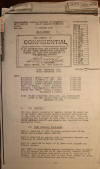
|
1 October
1932.
Excerpts from the
GN-2 Report Covering the Month of
August 1932.
[NOTE:
These excerpts constitute the sum total
of text devoted to the Atlantic Coast
region in this 33-page intelligence
report covering the entire country. The
image to the left is the report's cover
page only.]
"
[p. 1]
. . . LOCATION OF
THE ENEMY ELEMENTS. ¶
. . . [NOTE: Of the
24 EDSN chieftains surveyed in the first
5 pages, none are in the Eastern Area]
. . .
[p. 5]
UNITS IN CONTACT:
¶ [NOTE: Of the 17 military
contacts during the month, none were in
the Eastern Area] . . .
[p. 7]
STRENGTH AND
MOVEMENTS ¶ . . .
[p.
8] Sept 8– Group
of 60 bandits reported at Sacklin on
Coco River, Dept. Northern Bluefields.
[NOTE: Of 37 items in this
category, this is the only one in the
Eastern Area.] ¶ . . .
[p.
16]
WEEK ENDING
SEPTEMBER 12. ¶ . . .
GENERAL
INFORMATION. ¶ . . .
Reports from Northern Bluefields
indicate confirmation of report that
Simeon Gonzalez died of wounds. ¶
. . . ESTIMATE.
¶ . . .
[p. 18]
No invasion of any large bandit group is
expected in Northern Bluefields, but a
foray of small unorganized groups may be
expected most any time along the lower
Coco River or even a raid on one of the
Commissaries along the Standard Fruit
Co. railroad if the bandits believe they
can successfully accomplish it without
encountering Guardia patrols. ¶
Southern Bluefields and other southern
departments excluding Leon and
Chinandega should remain quiet. ¶
. . . .
[p. 19]
WEEK ENDING
SEPTEMBER 19. ¶ . . .
[p.
21]
ESTIMATE.
¶ . . . The Eastern Area and
Southern Department, (less Leon) should
remain quiet. ¶ . . .
[p. 24]
WEEK ENDING
OCTOBER 3. ¶ . . .
[p. 25]
ESTIMATE.
¶ . . . Eastern Area gives no
indications of bandit activities in the
coming week. ¶ . . .
[p. 33]
CONSOLIDATED
REPORT OF CONTACTS OF THE GUARDIA
NACIONAL FOR THE MONTH OF SEPTEMBER 1932
[NOTE: Of 17 military contacts,
none were in the Eastern Area]."
|
|
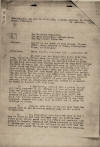
|
12 October
1932.
Report on the death of raso Ramsoy,
Thomas #2826, which occurred in Bacan,
Prinzapolka River, at 9:50 a.m.,
2nd Lt. E. Rourk
A., Wuani, p. 1.
"1. At 2:00 p.m.
Lt. Singletary along with Wing Long,
reported without arms nor shoes,
reporting that at Bacan, on the
Prinzapolka River the outboard motor in
which he and four enlisted were coming
[coming] capsized as they were passing
the Fall of Bacan. All the
passengers were in grave danger of their
lives and went ashore with great
difficulty with exception of raso
Ramsey, who wasn’t seen any more after
the boat had capsized. They all
lost their arms and ammunition including
all parts for the radio. Lt.
Singletary ordered Sgt. Garth and two
enlisted to stay in Bacan until rasa
Ramsey appeared and to wait there until
a detail of guardias from Wuani arrived.
After Lt. Singletary gave his orders he
proceeded to Wuani in company with Wing
Long. ¶ 2. I immediately
ordered that a patrol should get ready
composed of one officer and nine
enlisted armed with the Thompson machine
gun and a Browning automatic rifle.
The patrol left for Bacan at 3:15 p.m.
under the command of Lt. Sandino.
I also ordered a runner to Neptune Mine
with correspondence to notify Bluefields
of what had happened, because the radio
here is still out of order for shortage
of tubes. ¶ 3. Inclose with
this letter you will find the report
made by Lt. Francisco Sandino G.N. on
his patrol to Cuicuina. ¶ 4.
Lt. Singletary also reported that on his
way to Wauni he had been informed that
bandits numbered about thirty armed with
two rifles and machetes, had passed El
Guayaba, Guaslala and Illas situated on
the road to Matagalpa. The day he
was informed he was told that the
bandits had passed two days ago between
Illas and Guaslala. . . ."
|
|
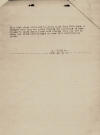
|
12 October
1932.
Report on the death of raso Ramsoy,
Thomas #2826, which occurred in Bacan,
Prinzapolka River, at 9:50 a.m.,
2nd Lt. E. Rourk
A., Wuani, p. 2.
". . . This last place mentioned is
about eight days from here. I
believe that they are going towards the
mountains of Pena Blanca to unite their
force with Pedron, they are low in arms.
Our spies have brought us news that
everything is quiet. ¶ E.
ROURKE A. ¶ 2nd. Lt. G.N."
|
|
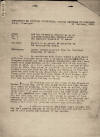
|
1.
13 October 1932.
Report on my patrol to Cuicuina on the
Prinzapolka River,
2nd Lt. Francisco
Sandino M. Wuani, p. 1.
"1.
In accordance with these orders I left
Wuani with nine enlisted armed with a
Browning automatic rifle, a Thompson
machine gun and a grenade discharger,
the rest were armed with Krag rifles.
On the eleventh day of the running month
at 1515, in a boat pushed by poles, we
arrived at Cuicuina at 1930. This
place is situated about two thousands
meters below the fall called Vacan, but
failing to find the guardias left there
by Lt. Singletary who had orders to wait
there until they could find some trace
of raso Ramsey, Thomas #2826, who had
disappeared the day before in the boat
that had capsized on its way to Wuani.
¶ 2. In Cuicuina and in the house
of Don Francis Castra [Francisco Castro]
I found Sgt. Garth with rasos Felton and
John Wilson in a state of calamity,
without shoes, hats or rifles, only with
pants and undershirts. They had
lost everything except their boxes that
were in another boat. At 1930
being informed by the guardias that they
had not found the body on that day and
that they had gone to that place in
search of food because there were no
houses close to where the accident had
occurred. We spent the night at
the house of señor Castro where I had
found the guardias without any
disturbance. ¶ 3. I did not
return that night to look for the lost
guardia because we thought him drowned
and for shortage of good lights and
besides it was unwise. . . . "
|
|
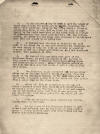
|
2.
13 October 1932.
Report on my patrol to Cuicuina on the
Prinzapolka River,
2nd Lt. Francisco
Sandino M. Wuani, p. 2.
" .
. . 4. On the following day at 0800 I
left the house of senor Castro with two
boats and my patrol including the three
other guardias, going up the river about
a thousand meters from where we had left
we found the body of raso Ramsey on the
right hand side of the river bank in a
state of putrefaction: the lower limb
was torn off, the abdomen opened, the
lower jaw and skull were brokened it is
believed that this was caused by an
alligator. ¶ 5. I ordered
that the body be taken to the left side
of the river for it was more suitable
for burying, as we were trying to bury
the body as quickly as possible because
it was in a state putrefaction. As
I had mentioned before, this occurred at
1000. ¶ 6. We buried him
complying with part of the Personnel
Manual chapter 111 paragraph 33, leaving
in the grave a bottle containing the
corresponding signs and instructions
given, except the fingerprints as the
body was in a very bad state. I
left a pole in form of a cross. ¶
7. The following signs indicated his
burial place which are as follows: about
a thousand meters from the house of don
Francisco Castro, on the left hand side
of the river, a hundred meters from the
water and four meters from a large tree
on the river bank. ¶ 8.
After all this we continued on our way
and about a hundred meters from where we
had buried Ramsey we found a canvas sack
floating on the river and according to
information given just then it was
property of Lt. Singletary, containing
parts for the radio and personal
belongings. ¶ 9. 1730 we
arrived at Wuani without any
disturbances while on the road. ¶
10. At the house of don Francisco Castro
in Cuicuina I was informed that on the
fifth of this month a group of thirty
bandits armed with four rifles and
machetes had reached Cuicuina. . . . "
|
|
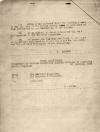
|
3.
13 October 1932.
Report on my patrol to Cuicuina on the
Prinzapolka River,
2nd Lt. Francisco
Sandino M. Wuani, p. 3.
" .
. . 11. After I was informed about the
bandits I went to see the rest of the
people living there to make sure of such
rumors but no one assured me of the
rumors. ¶ 12. At my arrival
at Wuani I reported all that had
occurred to the District Commander.
¶ 13. We opened the bag that was
found on the river on my arrival and
found in it all parts for the radio and
the personal belonging of Lt.
Singletary. ¶ F. Sandino"
|
|
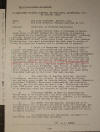
|
21 October
1932.
Conditions in Northern Bluefields,
Col. L. L. Leech,
Bluefields.
"1. On Sunday October 16th, I proceeded
by Marine Corps plane to PUERTO CABEZAS
for the purpose of observing conditions
in the Department of Northern
BLUEFIELDS. Conferring with Mr.
Scott, who recently took over management
of the STANDARD FRUIT COMPANY
established there, and to, from personal
observation, note what improvement has
been made in morale of both civilians
and Guardia, and in conditions in
general. ¶ 2. I found the
Department being admirably
administrated, the morale of both
civilians and guardia in a high state.
There is the very fullest cooperation
between Marines and Guardia, the Fruit
Company Officials and the local
government. All are pulling
together, with the result that
conditions are much improved and more
secure feeling prevalent throughout the
Department. The non activity of
the bandits for some time has been
instrumental in the feeling of security
which now exists. However, this
non activity has been caused by the
decisive results of Lieutenant
PETERSONS’ last contact at LECUS CREEK,
on July 6th, by the enlarged secret
service instituted by the Fruit Company
and by active patrolling upward the
WANKS RIVER from MOSS FARM and up the
river from CABO GRACIAS. ¶
3. The condition of the Guardia,
material, clothing, storerooms, barracks
and grounds, is especially gratifying
and reflects great credit on Captain
Davies, Department Commander, Lieutenant
PETERSON, Department Quartermaster and
Disbursing Officer, and the officers
assisting them. Conditions are
more than 100% better than this time
last year, and the Department is in
excellent shape for transfer to native
control. ¶ 4. Lieutenant
ZEPEDA to whom Quartermaster duties were
to be turned over, has been sick in the
hospital, and transfer has not yet been
effected. However, it is expected
to be completed before the end of the
month. ¶ 5. Mr. SCOTT, the
new manager, accompanied us on the
inspection of the Guardia activities
along the railroad, and expressed his
gratification and approval of the
Guardia efforts to defend the Line, and
of the plans and organization for prompt
offensive efforts. ¶ 6. My
anticipation for improvement throughout
the Department has been more than
justified. ¶ (signed) L. L.
LEECH"
|
|
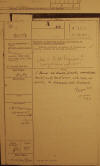
|
1.
29 October 1932.
Report & Mosquito petition.
D. M. Ferguson,
Representative of the Mosquito Indians
and Creoles of the Mosquito Reservation
of Nicaragua, to British Foreign
Minister, p. 1.
"I think we
should formally acknowledge receipt, and
send correspondence with copy of
petition, to Managua and Guatemala. P.
Mason"
|
|
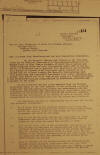
|
2.
29 October 1932.
Report & Mosquito petition.
D. M. Ferguson,
Representative of the Mosquito Indians
and Creoles of the Mosquito Reservation
of Nicaragua, to British Foreign
Minister, p. 2.
"May it
please Your Excellency, and our most
Honourable Government. ¶ We
the Mosquito Indians and Creoles of the
territory known as the Mosquito
Reservation, of Nicaragua, extending
from the Wangka River to Grey Town, a
distance of about three hundred and
fifty miles, but which has been
incorporated since 1894 in the Republic
of Nicaragua, beg to approach Your
Excellency and Government on a matter of
extreme vital importance which concerns
us as a people and our beloved country,
the Mosquito Coast, praying that Your
Excellency and Honourable Government
will kindly intervene and adjust this
affair for us so that we may enjoy the
rights, privileges and advancements, as
are being enjoyed by modernized
countries and peoples of the world.
¶ We are convinced and are quite
sanguine that the British Government
which is the most powerful in the world,
and one which stands for justice,
equity, love, liberty and advancement,
both educationally, commercially, and
industrially, will impartially give our
grievance as set forth, Your most
earnest and diplomatic considerations,
and act accordingly on our behalf, so
that we receive those things, which by
international laws are our rights and
privileges. ¶ In consequence
thereof we respectfully beg to make the
following authentic statements: ¶
1. Be it known that we the Mosquito
Indians were a free and independent race
from before the advent of Christopher
Columbus to the Western World in 1492,
having our own form of Government and
ruled by the Kings. ¶ 2.
That is was the Mosquito Indians who
befriended the Great Discoverer and
helped him in his sad predicament when
he landed at the place now named Cape
Gracias a’ Dios. ¶ 3. That
in the early part of the seventeenth
century, one of our Kings Jeremy by
name, went to Jamaica, British West
Indies to the Duke of Albemarle then
Governor of the Island and prayed that
his country the Mosquito Coast be taken
under the protection of the English
Government, as he the King Jeremy feared
that Spaniards who were now swarming to
the Western World, which request was
granted. ¶ 4. That we
Indians and our beloved country, the
Mosquito Coast, remained under England’s
protection until the year 1860. When on
the 28th of January of the same year
(1860), a treaty called the Treaty of
Managua was made between the British . .
. "
|
|
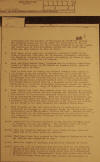
|
3.
29 October 1932.
Report & Mosquito petition.
D. M. Ferguson,
Representative of the Mosquito Indians
and Creoles of the Mosquito Reservation
of Nicaragua, to British Foreign
Minister, p. 3.
". . .
Government and the Republic of
Nicaragua, by which our country, The
Mosquito Coast, was placed under the
protection of the Republic of Nicaragua,
we are still having reserved to us our
rights and privileges of self-government
having our own rules whose title was
then reduced to that of Chief. ¶
5. That these above mentioned conditions
continued until on the 13th of February
1894, when the Nicaraguan Government
overthrew the Mosquito Government and
seized our country by force of arms,
thus violating the Treaty of Managua.
¶ 6. That our Chief Robert Henry
Clarence was by existing conditions
forced to seek refuge in the Island of
Jamaica B.W.I. where he remained until
he died. ¶ 7. That to make
sure of having our beloved country more
firmly in its deadly grasp, and probably
to vindicate and establish his rights of
ownership, the Nicaraguan Government
called delegates of Indians from the
various villages to Bluefields and by
sweet words and glorious promises
together with the free distribution of
intoxicating liquors drew up a document
called the Mosquito Convention to which
the Nicaraguan Government caused the
Indians to affix their names. (Copy of
Mosquito Convention enclosed). ¶
8. That thirty five years have passed
since the signing and putting into
effect this solemn law and covenant, the
Mosquito Convention, but not one of its
decrees contained therein has been lived
up to by Nicaraguan Government.
That the Nicaraguan Government has
totally disregarded the Decrees of the
Mosquito Convention and therefore has
forfeited all rights and privileges to
our country as set forth in the said
document the Mosquito Convention.
¶ 9. That in spite of the fact
that millions of dollars have been
collected as revenues in the Mosquito
Coast the Custom dues alone aggregating
about Thirty-Three Million Dollars.
Absolutely nothing has been done by the
Nicaraguan Government for the benefit of
our country, the Mosquito Coast; and we
the inhabitants, the Mosquito Indians.
¶ Art. 2. says—All the revenue
produced in the Mosquito Litoral shall
be inverted in its own benefit.
The revenues have not been inverted for
the benefit of the Mosquito Litoral.
¶ Art. 3. That the Mosquito
Indians have been forced to bear arms
and fight and to do other military
services. ¶ Art. 4 That
taxes have been imposed on the Mosquito
Indians which they the Indians were
compelled to pay. ¶ Art. 5
That the rights of suffrage has not been
extended to women. ¶ Art. 6
That the post of Inspector has not been
held by any Mosquito Indian, except one;
and that is very recently. That
the post of Inspector has been always in
every place held by a Nicaraguan
Spaniard, styled the “Commandante” whose
only desire was and is to inflect heavy
fines for the most trivial offences;
most of . . . "
|
|
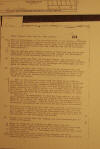
|
4.
29 October 1932.
Report & Mosquito petition.
D. M. Ferguson,
Representative of the Mosquito Indians
and Creoles of the Mosquito Reservation
of Nicaragua, to British Foreign
Minister, p. 4.
" . . . which
(fines) went into his own coffers.
¶ 10. That in consequence of the
non-fulfillment of the Decree of the
solemn law and covenant: the Mosquito
Convention by the Nicaraguan government
we the Mosquito Indians declare that
this document the Mosquito Convention
becomes null and void and the act of
incorporation annulled. ¶
11. That we Indians being utterly unable
to fight for our rights and could never
think of raising up in arms against the
Nicaraguan Government being extremely
powerless so to do. ¶ 12.
And that realizing that our beloved
country and ourselves are practically
going to ruin, and desiring for
ourselves and children and the
generations to come the blessings and
privileges now enjoyed by modern
civilized countries. ¶ 13.
And that our heart felt desire now is to
be released from the yoke of the
Nicaraguan Government, who has
deliberately and openly before the
world, disregarded and discountenanced
the Decree of the solemn law and
covenant, the Mosquito Convention which
they drew up and signed. ¶
14. That of this present crisis when the
Bandits are killing, robbing and
ill-using our women in a most
disgraceful manner, and our country is
in a most disturbed position; when there
is no right protection afforded us for
life and property, the Spaniards having
overrun our country and we are ill-used
and ill-treated and killed. We now
more than ever are convinced that the
time is now opportune that it is
incumbent that our country be again
restored to us. ¶ Therefore
in consequence of what has been said, we
the Mosquito Indians and Creoles are now
praying that Your Government separate
our country the Mosquito Coast from
Nicaragua, and restore to us our
country. That we will have the
British form of Government independent
and free from the Nicaraguan Government.
¶ 14. Therefore we humbly pray
that Your most esteemed and Honourable
Government will intervene for our poor
Indians behalf and take up the matter
with the Nicaraguan Government and
adjust same so that we the poor Indians
may receive our rights as are put forth
in our dispatch to the Nicaraguan
Government. ¶ 15. We may
here mention that our country has vast
resources; but requires development.
¶ A. There is abundance of gold,
silver, and copper and oil. ¶
B. There are waste tracts suitable to
rice cultivation from which millions of
bushels of rice could be harvested each
year. ¶ C. There are waste
tracts of savannahs very suitable for
the cultivation of cotton. ¶
D. Our forests abound with rubber, pine,
mahogany and cedar. ¶ E. That our soil
is well adapted to the cultivation of
pine-apples, bananas and citrus fruits.
. . . "
|
|
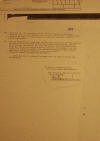
|
5.
29 October 1932.
Report & Mosquito petition.
D. M. Ferguson,
Representative of the Mosquito Indians
and Creoles of the Mosquito Reservation
of Nicaragua, to British Foreign
Minister, p. 5.
" . . . 16.
That had not the Bragman’s Bluff Lumber
Company an American Concern come to this
country and started operations in Lumber
and bananas by which we have procured
work, our condition would be most
deplorable. ¶ 17. Can we
engender the hope that in the near
future we and our country be under the
protection of Your Honourable
Government? Should that be, then already
we see with our mind’s eye, beautiful
towns with the latest of modern
fixtures, schools and colleges, law and
order; our country teaming with
companies, factories, and workmen, and
above our heads flowing in the breeze
the:- "FLAG OF JUSTICE, FREEDOM AND
LIBERTY." ¶ Thanking you in
advance for this and all other favours
and kindnesses. ¶ We beg to
remain, Hon. Sir. Your most Humble
Petitioners ¶ The Mosquito
Indians and Creoles. About 150,000
¶ D.M. Ferguson, Representative"
|
|
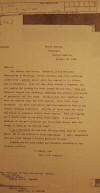
|
6.
29 October 1932.
Report & Mosquito petition.
D. M. Ferguson,
Representative of the Mosquito Indians
and Creoles of the Mosquito Reservation
of Nicaragua, to British Foreign
Minister, p. 6.
"Hon. Sir
¶ The Indians and Creoles,
(natives) of the Mosquito Reservation of
Nicaragua, Central America, have been
suffering always from a general unrest
which has reached to its climax, and is
unbearable. They are like sheep
without a shepherd, and are begging and
praying for their former British Rule.
They are murdered dragged into banditry,
suffering from general destruction of
properties and live stock.
Villages that were inhabited for over
one hundred years had been vacated.
Their fruit trees destroyed. All
these brutalities had been imposed on
them by the Spanish speaking population.
Portions of their lands are taken and
leased to Companies without their
consent. They are begging for a
direct ruler to see about their rights.
I am asked by hundreds of the most
prominent men to be their Moses, with
the slogan of “Back to the British
Flag.” ¶ I am a Britainer
who had been laboring among them for
several years, and an eye witness to
these happenings. I shall
communicate with you later through a
British Barrister at Law. ¶
Begging you for your prompt and
honorable attention to the enclosed
petition. ¶ I remain, etc.
¶ (Sd.) D. M. Ferguson"
|
|
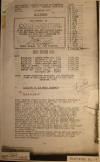
|
1 November
1932.
Excerpts from the
GN-2 Report Covering the Month of
October 1932.
[NOTE: These excerpts constitute the
sum total of text devoted to the
Atlantic Coast region in this 30-page
intelligence report covering the entire
country. The image to the left is
the report's cover page only.]
"
[p. 1] . . .
LOCATION OF THE
ENEMY ELEMENTS. ¶ . .
. [NOTE: Of the 14 EDSN
chieftains surveyed in the first 4
pages, none were active in the Eastern
Area] . . .
[p. 5]
UNITS IN CONTACT:
¶ [NOTE: Of the 14
military contacts during the month, none
were in the Eastern Area] . . .
[p. 6]
STRENGTH AND
MOVEMENTS ¶ . . .
[NOTE: Of 12 items in this
category, none were reported in the
Eastern Area.] ¶ . . .
[p. 9]
WEEKLY
INTELLIGENCE ESTIMATE FOR WEEK ENDING
OCTOBER 10. ¶ . . .
[p. 10]
Entire Eastern
Area . . . quiet during week. ¶
. . .
[p. 11]
. . . WEEK ENDING
OCTOBER 17. ¶ . . .
[p. 12]
Eastern Area and Southern Departments
quiet during week. ¶ . . .
[p. 13]
. . .
WEEK ENDING OCTOBER 24. ¶
. . .
[p. 14]
ESTIMATE.
¶ . . . Eastern Area and Southern
Depts. . . . should remain quiet this
week. ¶ . . .
[p. 15]
WEEK ENDING
OCTOBER 31. ¶ . . .
[p. 16]
GENERAL
INFORMATION. ¶ . . .
Eastern Area has been quiet during week.
Area Commander, Eastern Area, reports
conditions better than for some time.
¶ . . .
[p. 17]
ESTIMATE.
¶ . . . Little trouble is expected
in the Eastern Area. ¶ . . .
[p.
30]
CONSOLIDATED
REPORT OF CONTACTS OF THE GUARDIA
NACIONAL FOR THE MONTH OF SEPTEMBER 1932
[NOTE: Of 14 military contacts, none
were in the Eastern Area]."
|
|
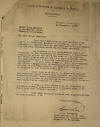
|
24 November
1932.
Letter from Rear
Admiral C. H. Woodward, Chairman
of the U.S. Electoral Mission to
Nicaragua, Managua, to Major John
Marston, Managua.
|
|
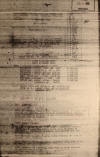
|
1 December
1932.
Excerpts from the
GN-2 Report Covering the Month of
November 1932.
[NOTE:
These excerpts constitute the sum total
of text devoted to the Atlantic Coast
region in this 29-page intelligence
report covering the entire country. The
image to the left is the report's cover
page only.]
"
[p. 1] . . .
LOCATION OF THE ENEMY ELEMENTS.
¶ . . . [NOTE: Of the 14 EDSN
chieftains surveyed in the first 4
pages, none were active in the Eastern
Area] . . . [p.
5]
UNITS IN CONTACT:
¶ . . . 3 NOV: Cabo [Private]
Blandon and Cabo Gracias patrol of 10
enlisted had contact with a group of 60,
jefe unknown, at MOKARIN (lower Rio
Coco). Fighting lasted one hour.
Bandit casualties unknown, but
indications of both killed and wounded.
No guardia casualties. Guardia
captured several boats, baggage, loot
and miscellaneous articles. ¶
[NOTE: Of 22 military contacts
during the month, one was in the Eastern
Area] . . .
[p. 7]
STRENGTH
AND MOVEMENTS ¶
[NOTE: Of 19 items in this category,
none were reported in the Eastern Area.]
¶ . . .
[p. 10]
WEEKLY
INTELLIGENCE ESTIMATE FOR WEEK ENDING
NOVEMBER 7. ¶ . . .
UNITS IN CONTACT
DURING WEEK . . .
[p.
11] [repeat
of above report of Cabo Blandon’s
contact, here spelled “MOKARIM”] .
. . [p.
13]
WEEK ENDING
NOVEMBER 14. ¶ . . .
[p. 14]
Eastern Area very quiet during week.
¶ . . .
[p. 15]
WEEK ENDING
NOVEMBER 21. ¶ . . .
[p.
16] Eastern Area
reports conditions quiet. ¶
. . .
[p.17]
WEEK ENDING
NOVEMBER 28. ¶ . . .
[p.
18] Eastern
Area and other Southern Departments
should remain quiet. ¶ . . .
[p.
29]
CONSOLIDATED
REPORT OF CONTACTS OF THE GUARDIA
NACIONAL FOR THE MONTH OF NOVEMBER 1932.
¶ . . . 3 NOV: Cabo Blandon,
MOKARIN, [captured] boats, loot ¶
[NOTE: Of 22 military contacts in
November, one was in the Eastern Area –
that of Private (Cabo) Blandón, above;
the original report has not been found.]"
|
|
|
|
|
PREVIOUS
NEXT |
|
|
|
|
|
|
|
